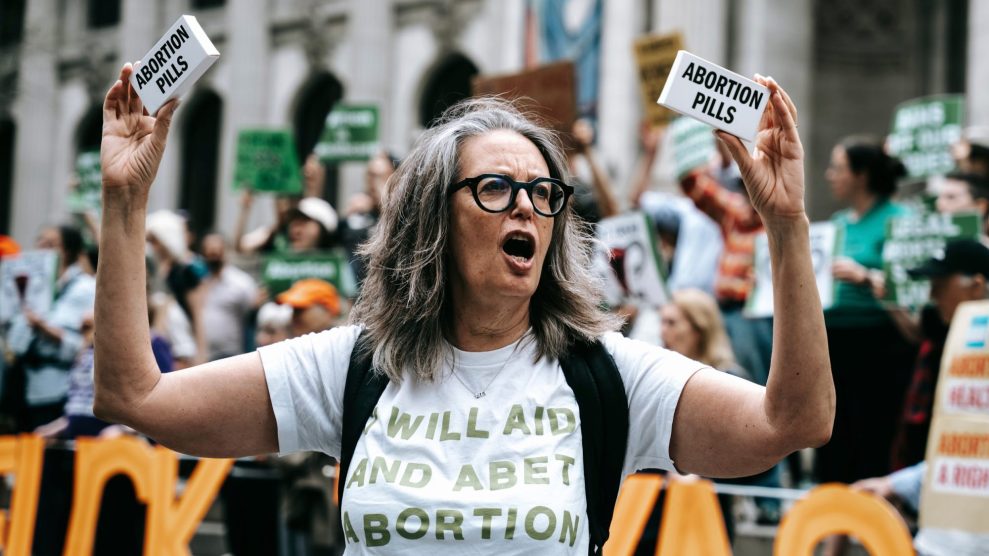
Álvaro Bernis
In early May 2022, reproductive health researcher Liz Mosley was at a dinner celebrating her first day as an assistant professor at the University of Pittsburgh School of Medicine when the news broke: A leaked draft of the Dobbs decision revealed the Supreme Court’s plan to gut abortion rights in the United States—the “worst-case scenario,” as one dinner guest put it.
Mosley also worried the ruling would upend her work as a scientist. She and her colleagues were in the process of conducting a study of Americans’ attitudes toward pregnancy, which included interviews and a survey asking 550 pregnant people ages 15 to 49 from around the country about options they’d considered. Some reproductive health clinics in Texas, from which she’d hoped to recruit—and where SB 8, an especially restrictive state law, was already making providers jittery—were spooked. “We lost Texas as a research site,” she told me. “The clinics just said the risk to their patients, legally, is too high.”
The decimation of reproductive health care has been predictably brutal in the two years since the Dobbs ruling. Abortion is now banned (or nearly so) in at least 17 states, dozens of providers have stopped offering abortions, and an untold number of clinicians have fled red states. You can add to that yet another post-Roe ripple: the challenges public health researchers like Mosley now face. Studies related to abortion have been delayed, limited, and blocked at a time when understanding the landscape couldn’t be more critical.
“The clinics just said the risk to their patients, legally, is too high.”
Some of the research holdups are the result of legitimate concern for participants. In Pennsylvania, where abortion is legal but restricted, Pitt’s Institutional Review Board (IRB), an ethics committee overseeing research at the university, asked Mosley to alter her study design, citing data privacy fears and the prospect of meddling by law enforcement. She agreed to some big changes, which mostly included eliminating minors from the interviews. “You can imagine that was a real loss,” she says. Research suggests that financial and logistical obstacles may cause teens to discover their pregnancies later than adults and encounter more challenges accessing care. Now, Mosley says, it’s harder for her team to identify how to best support pregnant minors, and to determine the “long-term health and social impacts” of their life path, whether it involves abortion, adoption, or parenting.
In 2023, Mosley conducted another survey, this time of her peers: In a questionnaire, some two dozen reproductive health researchers shared their experiences with their own institutional review boards. Most reported some kind of challenge, like confusion over state laws, increased scrutiny of abortion-related work, and at least one researcher’s total inability to get studies greenlit. Even projects not obviously associated with abortion, Mosley says, were affected by Dobbs. Some universities, for instance, are now requiring “full board review” for any study involving pregnancy.
What’s more, previously available stats—the number of abortions per Georgia county, for example—have been stripped from government websites, and accurate granular data is “much harder to get our hands on,” Mosley says. (A spokesperson from the Georgia Department of Public Health confirms that local abortion data was removed last year after “a legal review,” but said state-level data is still public.)
Sociologist Tracy Weitz, who studies reproductive health at American University in Washington, DC, tells me that some of the best data for understanding health inequities, such as patients’ race, ethnicity, and zip code, was once provided by states hostile to abortion, where anti-choice lawmakers instituted data collection as a regulatory hoop for abortion providers to jump through. But with abortion now banned in those places, much of the data is gone.
Even in blue states, providers are more hesitant to share certain demographic data, or even collect it—Illinois and Maine, for example, have stopped gathering some information. “That data becomes important when we’re trying to figure out who in the post-Dobbs environment is getting abortions and who isn’t,” Weitz says. (It’s also critical to helping policymakers understand the consequences of their actions.)
One solution is anonymous surveys,but those present their own challenges. During a 2023 workshop held by the National Academies of Sciences, Engineering, and Medicine, University of Wisconsin reproductive health researcher Jenny Higgins reported that fake individuals, or “bots,” had submitted about 3,000 responses to one of her surveys one weekend. Her team then had to spend hours on data quality checks and hire a data scientist to “weed out” ineligible participants.
Researchers also say it’s gotten harder to secure a “certificate of confidentiality” from the National Institutes of Health—a designation that can prevent sensitive information collected as part of a study from being subpoenaed. The agency has started asking researchers whether they have privacy agreements with third-party companies like Zoom and Microsoft stating that the companies will not share participant data. But tech companies have little incentive to make that promise. (The NIH insists there have been “no changes” to its certification policy since it took effect in 2017.)
One silver lining: Dobbs has brought about an “all hands on deck” moment and more interest in the field.
The work environment “hasn’t all been bad,” says Diana Greene Foster, a demographer and professor at the University of California, San Francisco, whose institutional review board has actually expedited abortion-related research. Dobbs, in her experience, has brought about an “all hands on deck” moment and more interest in the field. In anticipation of the ruling, Foster launched an effort to study the last people to terminate their pregnancies in states where bans were to take effect, comparing their experiences to those who sought abortions afterward. The initial results, she says, appear to show that the number of people who failed to obtain an abortion is “much lower” than she expected, perhaps because they were able to obtain abortion pills online.
But the overall sentiment I heard from researchers is that they want more support from the federal government. Mosley says universities need “unifying” guidance that directs institutional review boards to fast-track abortion studies and helps researchers assess the legal and social risks for participants from different states. Especially needed, Weitz says, is protection from subpoenas. There are no federal laws that automatically protect the privacy of abortion seekers whom researchers question remotely by phone, email, or video chat.
More fundamentally, the researchers want the government to normalize the study of abortion, which is historically underfunded due to stigma. This year, the White House called on Congress to fund a $12 billion initiative to support “women’s health research”—but it’s unclear which studies will be eligible. In the meantime, Weitz says, the work has been left largely to privately funded academics and journalists. Abortion is health care, and the government has “an obligation,” she insists, “to study it the way they study any other major public health issue in the United States.”
















